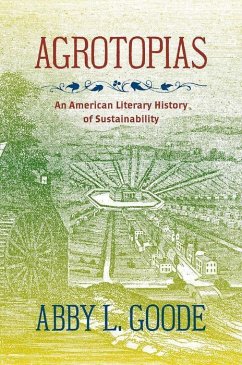"In this book, Abby L. Goode reveals the foundations of American environmentalism and its enduring connections to racism, eugenics, and agrarian ideals. Throughout the nineteenth century, writers as diverse as Martin Delany, Charlotte Perkins Gilman, and Walt Whitman worried about unsustainable conditions such as population growth and plantation slavery. In response, they imagined 'agrotopias'-sustainable societies unaffected by the nation's agricultural and population crises-elsewhere. Though seemingly progressive, these agrotopian visions depicted selective breeding and racial 'improvement' as the path to environmental stability. In this fascinating study, Goode uncovers an early sustainability rhetoric interested in shaping, just as much as sustaining, the American population"--
Hinweis: Dieser Artikel kann nur an eine deutsche Lieferadresse ausgeliefert werden.
Hinweis: Dieser Artikel kann nur an eine deutsche Lieferadresse ausgeliefert werden.








